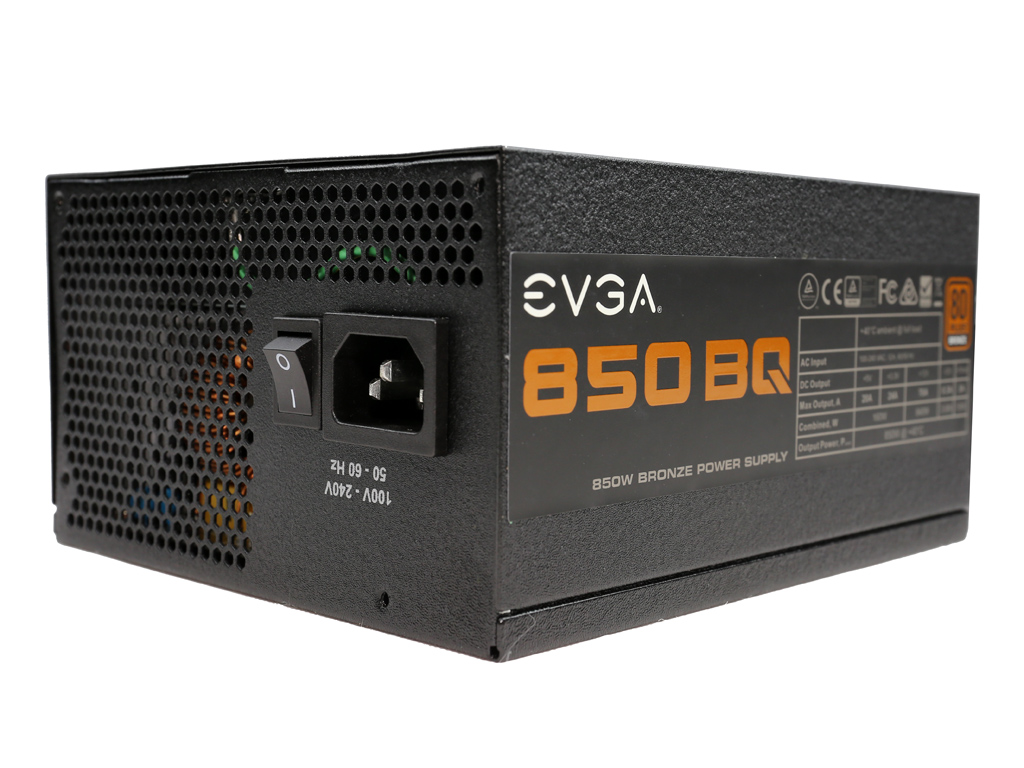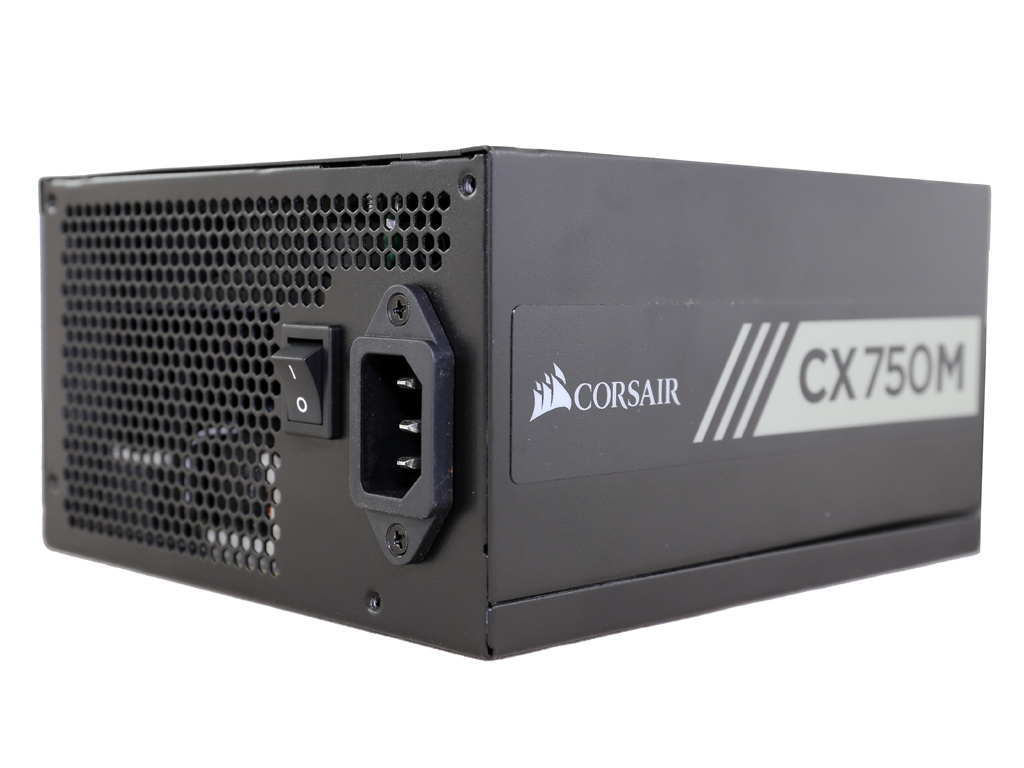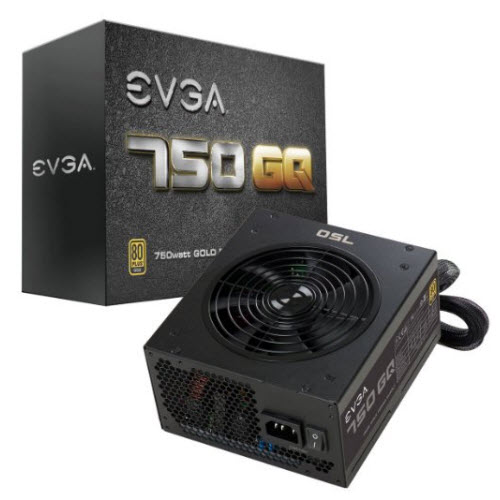EVGA BQ Series 850W PSU Review
One of EVGA's most affordable power supply families, the BQ, includes five unique models. The higher-capacity ones are made by HEC and the rest come from Andyson. Today we're testing the flagship 850 BQ.
Why you can trust Tom's Hardware
Load Regulation, Hold-Up Time, And Inrush Current
To learn more about our PSU tests and methodology, please check out How We Test Power Supply Units.
Primary Rails And 5VSB Load Regulation
Load Regulation testing is detailed here.
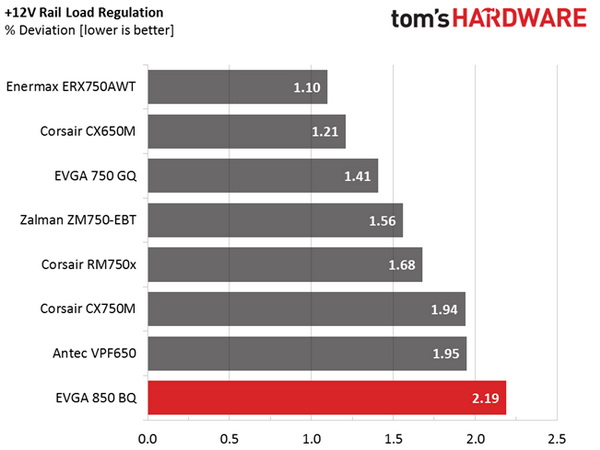
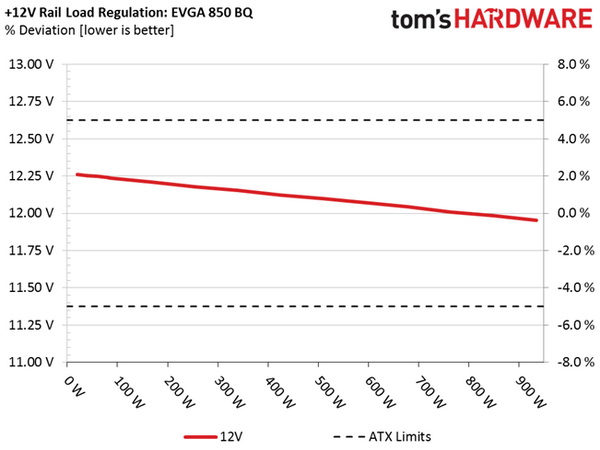
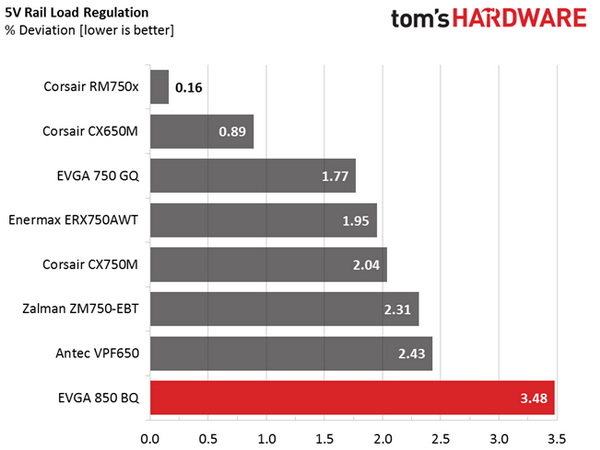
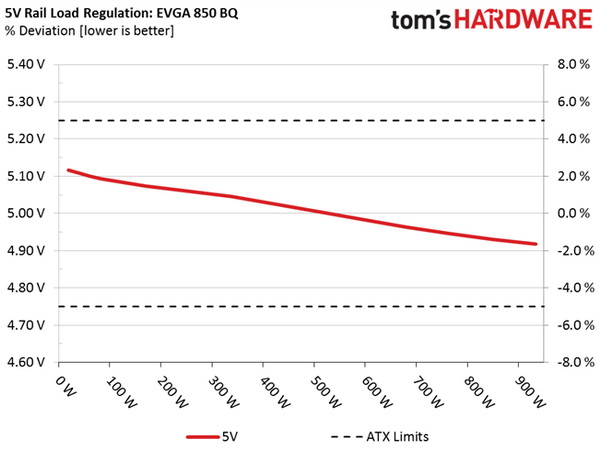
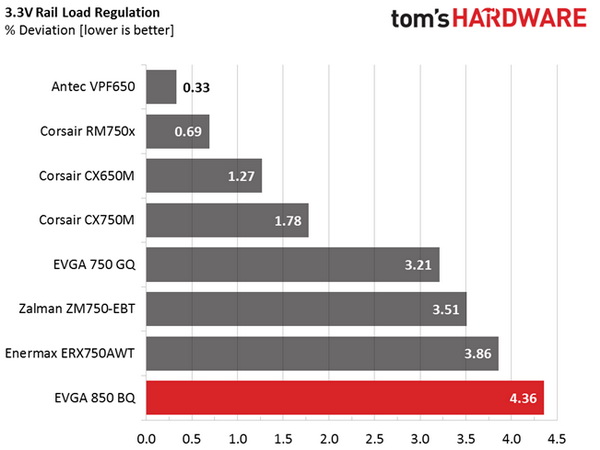
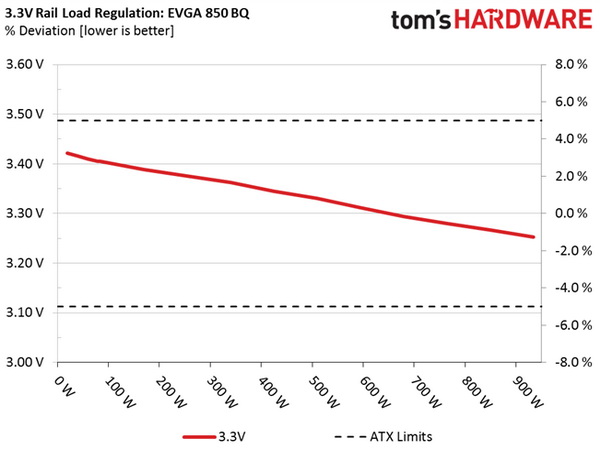
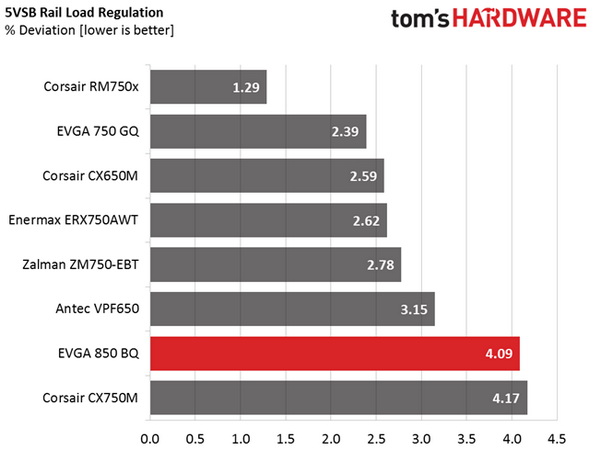
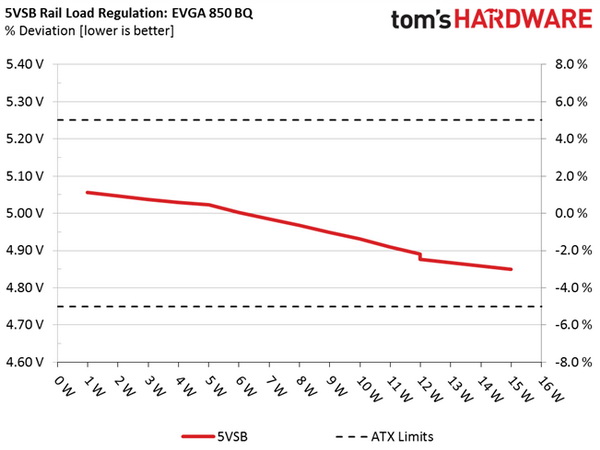
Hold-Up Time
Our hold-up time tests are described in detail here.
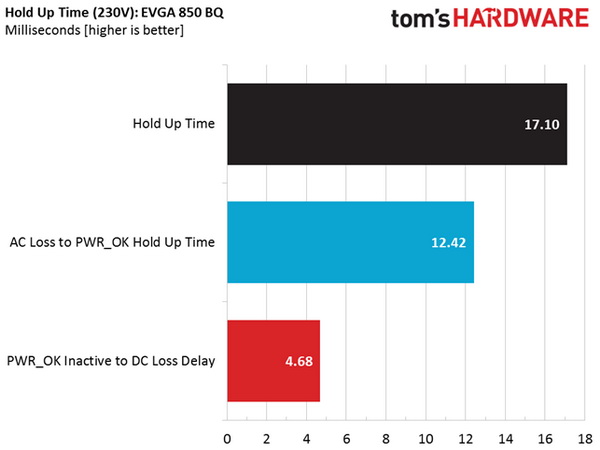
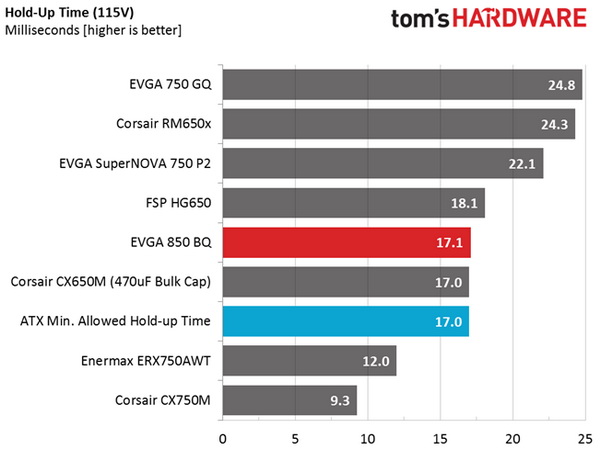
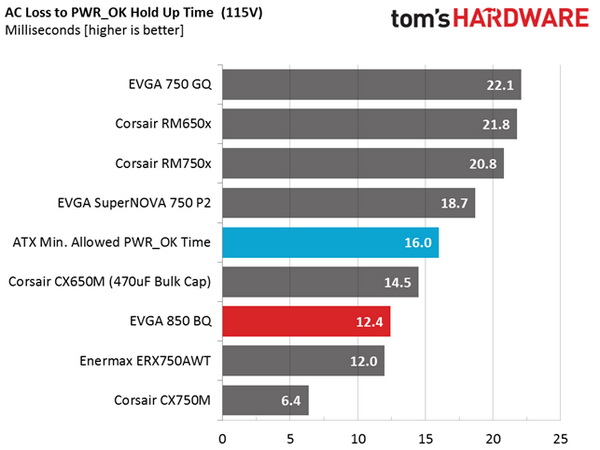
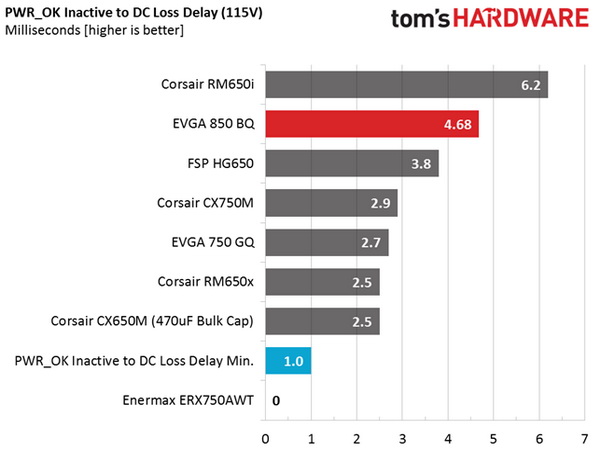
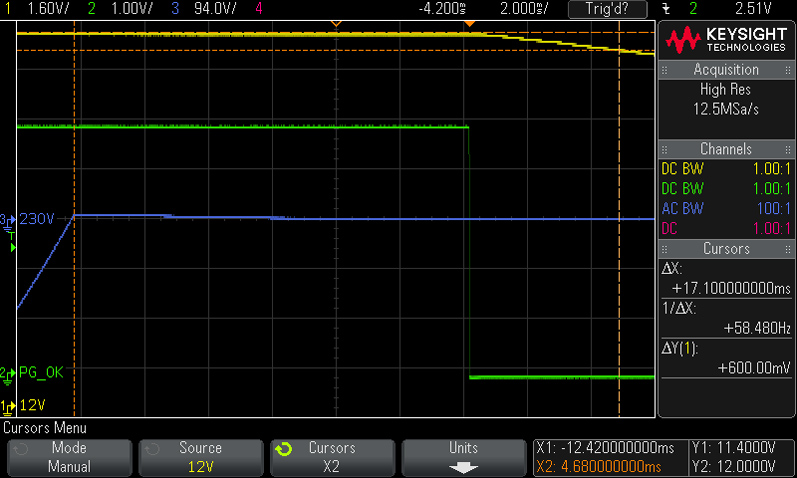
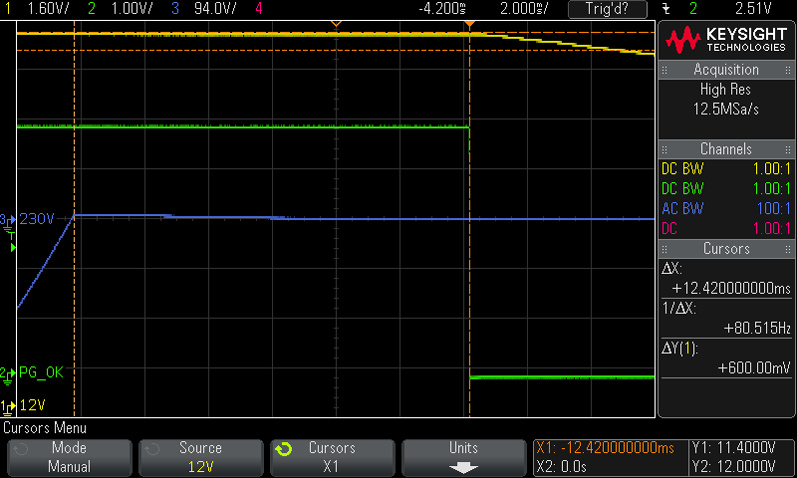
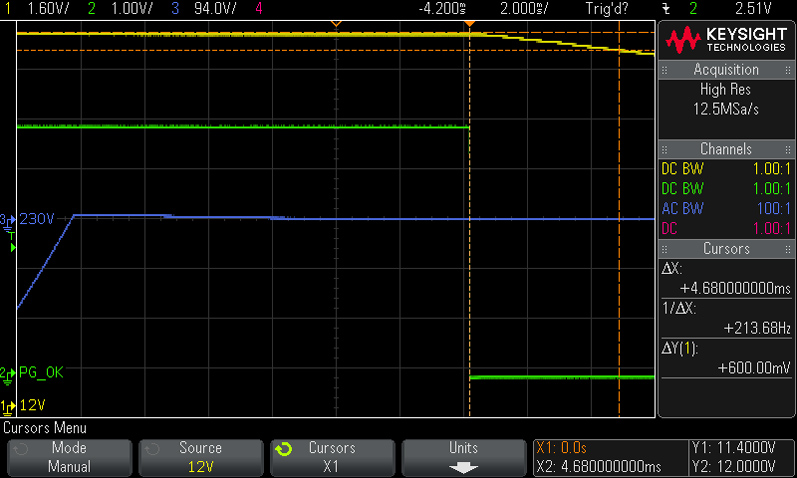
Though the measured hold-up time exceeds 17ms, the power-good hold-up time is lower than 16ms. By tuning this delay, the power-good signal could be made to exceed 16ms. At least this signal is accurate, since it drops before the rails go out of spec.
Inrush Current
For details on our inrush current testing, please click here.
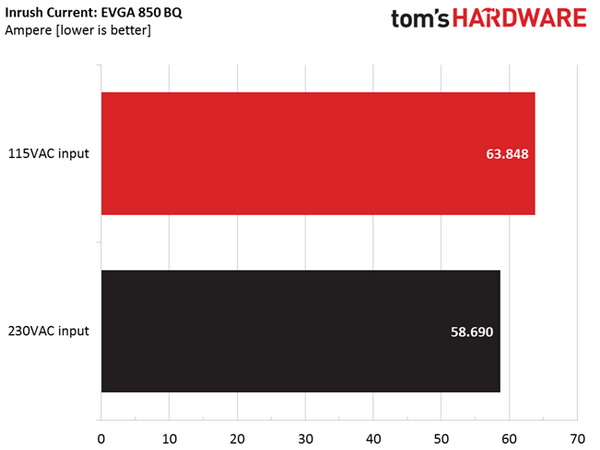
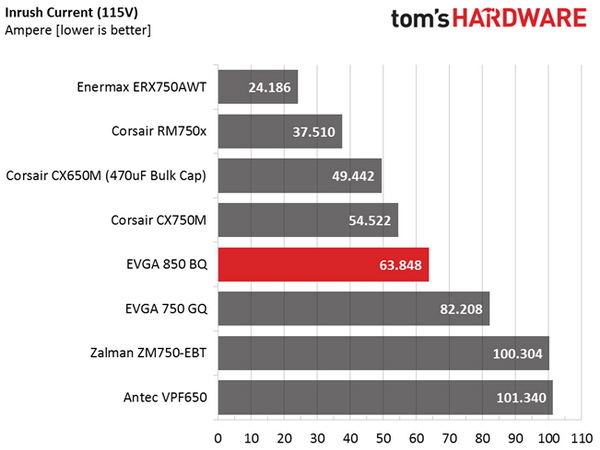
Inrush current is high with both voltage inputs. HEC should take a closer look at this.
Load Regulation And Efficiency Measurements
The first set of tests reveals the stability of the voltage rails and the EVGA 850 BQ's efficiency. The applied load equals (approximately) 10 to 110 percent of the PSU's maximum load in increments of 10 percentage points.
Get Tom's Hardware's best news and in-depth reviews, straight to your inbox.
We conducted two additional tests. During the first, we stressed the two minor rails (5V and 3.3V) with a high load, while the load at +12V was only 0.1A. This test reveals whether a PSU is Haswell-ready or not. In the second test, we determined the maximum load the +12V rail could handle with minimal load on the minor rails.
| Test # | 12V | 5V | 3.3V | 5VSB | DC/AC (Watts) | Efficiency | Fan Speed | Fan Noise | Temps (In/Out) | PF/AC Volts |
|---|---|---|---|---|---|---|---|---|---|---|
| 1 | 5.165A | 1.964A | 1.936A | 0.995A | 84.79 | 80.93% | 1120 RPM | 38.8 dB(A) | 37.00°C | 0.987 |
| 12.235V | 5.093V | 3.405V | 5.023V | 104.77 | 40.40°C | 115.2V | ||||
| 2 | 11.365A | 2.948A | 2.919A | 1.196A | 169.60 | 85.22% | 1120 RPM | 38.8 dB(A) | 38.47°C | 0.983 |
| 12.210V | 5.074V | 3.388V | 5.003V | 199.01 | 42.94°C | 115.1V | ||||
| 3 | 17.964A | 3.458A | 3.434A | 1.400A | 254.85 | 86.60% | 1135 RPM | 39.0 dB(A) | 40.11°C | 0.990 |
| 12.179V | 5.059V | 3.375V | 4.985V | 294.28 | 46.06°C | 115.1V | ||||
| 4 | 24.564A | 3.963A | 3.924A | 1.609A | 339.73 | 86.80% | 1150 RPM | 39.2 dB(A) | 41.98°C | 0.993 |
| 12.154V | 5.045V | 3.362V | 4.968V | 391.38 | 48.83°C | 115.1V | ||||
| 5 | 30.866A | 4.972A | 4.930A | 1.816A | 424.68 | 86.43% | 1395 RPM | 43.0 dB(A) | 43.48°C | 0.995 |
| 12.124V | 5.025V | 3.345V | 4.949V | 491.38 | 50.53°C | 115.1V | ||||
| 6 | 37.190A | 5.994A | 5.945A | 2.025A | 509.67 | 85.74% | 1550 RPM | 46.1 dB(A) | 43.64°C | 0.996 |
| 12.097V | 5.005V | 3.330V | 4.932V | 594.47 | 51.50°C | 115.1V | ||||
| 7 | 43.542A | 7.019A | 6.973A | 2.239A | 594.62 | 85.00% | 1665 RPM | 48.3 dB(A) | 43.84°C | 0.997 |
| 12.070V | 4.984V | 3.312V | 4.910V | 699.59 | 52.16°C | 115.1V | ||||
| 8 | 49.917A | 8.061A | 8.013A | 2.451A | 679.49 | 84.12% | 1780 RPM | 49.0 dB(A) | 44.48°C | 0.998 |
| 12.042V | 4.963V | 3.294V | 4.890V | 807.76 | 53.13°C | 115.1V | ||||
| 9 | 56.777A | 8.594A | 8.566A | 2.459A | 764.49 | 83.14% | 1830 RPM | 49.7 dB(A) | 45.29°C | 0.998 |
| 12.010V | 4.946V | 3.280V | 4.877V | 919.49 | 54.20°C | 115.1V | ||||
| 10 | 63.378A | 9.127A | 9.090A | 3.091A | 849.33 | 82.22% | 1840 RPM | 50.0 dB(A) | 45.46°C | 0.998 |
| 11.986V | 4.930V | 3.267V | 4.849V | 1033.00 | 55.15°C | 115.2V | ||||
| 11 | 70.652A | 9.152A | 9.126A | 3.099A | 934.26 | 81.08% | 1925 RPM | 51.2 dB(A) | 46.32°C | 0.998 |
| 11.954V | 4.918V | 3.253V | 4.837V | 1152.23 | 56.17°C | 115.1V | ||||
| CL1 | 0.101A | 19.021A | 19.001A | 0.003A | 156.96 | 77.77% | 1330 RPM | 42.2 dB(A) | 44.07°C | 0.984 |
| 12.184V | 4.931V | 3.259V | 4.976V | 201.83 | 53.34°C | 115.1V | ||||
| CL2 | 69.958A | 1.002A | 1.003A | 1.002A | 851.51 | 82.77% | 1885 RPM | 50.9 dB(A) | 46.58°C | 0.998 |
| 11.982V | 5.003V | 3.317V | 4.922V | 1028.80 | 56.43°C | 115.1V |
Load regulation is bad, especially on the minor rails (including 5VSB). At least our efficiency measurements do satisfy the 80 PLUS Bronze requirements. Also, the PSU doesn't have a problem delivering its full power under a very high ambient temperature, which actually exceeds EVGA's official maximum rating (40°C). The fan is super noisy though, and even under lighter loads it spins fast. Obviously HEC wants to cool the secondary side's Teapo SC capacitors as effectively as possible, so it tuned the fan's minimum speed to 1120 RPM.
Current page: Load Regulation, Hold-Up Time, And Inrush Current
Prev Page A Look Inside And Component Analysis Next Page Efficiency, Temperature, And Noise
Aris Mpitziopoulos is a contributing editor at Tom's Hardware, covering PSUs.
-
Metteec Also, for $20 more, you can pick up an equivalent gold rated PSU or maybe even a platinum one on sale and after rebates. It is the halcyon days for competition in quality PSUs.Reply -
_TheD0ct0r_ Reply19020704 said:Thanks for the review. Looks like I will be avoiding this one.
Why is that?
-
Metteec @_THEDICTOR_, for $85, there are so many other better options. EVGA could have been more competitive model if they made quieter version. Instead, you get a PSU with fixed cables, low efficiency, high power variances, and noise like a mini-vacuum. While the higher quality capacitors and warranty are nice, the lack of utility does not make this a good value. 3-years ago, this would have been a great PSU, but times have changed. It is a great day to buy a PSU, just not this one.Reply -
MasterMace appears to be another terrible unit. I'll have to read back and see if it's an Andyson or a HECReply -
Nuckles_56 I would have thought that EVGA could have pushed HEC a bit harder and got a much better unit out of them than thisReply -
lunyone I would personally like to see more 450-550w PSU reviews, not the cherry picked and delivered 750w+ ones that seem to make the rounds. It is just that most people are only going to need 450-550w PSU's for their 1 dGPU based systems.Reply -
Aris_Mp This is not a cherry-picked sample. It comes directly from a store shelf and not from EVGA.Reply
As for more 450-550W PSU reviews, I am currently working on a 500W unit (which however isn't affordable).
